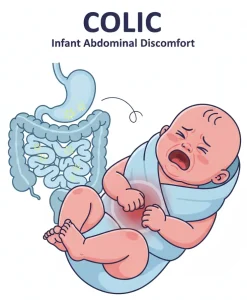Overview
Diagnosis
Your baby’s healthcare provider will perform a complete physical examination to identify possible causes of distress. The evaluation includes:
-
Measuring height, weight, and head circumference
-
Listening to the heart, lungs, and abdomen
-
Examining the limbs, fingers, toes, eyes, ears, and genitals
-
Assessing the baby’s response to touch or movement
-
Checking for rashes, inflammation, infections, or allergies
Usually, lab tests or X-rays are not required, but they may be done in unclear cases to rule out other medical conditions.
More Information:
-
X-ray (only if necessary to exclude other conditions)
Treatment
The main goals are to soothe your baby and support the parents in coping with the situation.
Soothing Strategies
Having a list of soothing methods can help you find what works best. You may need to try different approaches at different times. Some useful strategies include:
-
Using a pacifier
-
Taking your baby for a car ride or stroller walk
-
Rocking or carrying your baby
-
Swaddling in a soft blanket
-
Giving a warm bath
-
Rubbing the tummy or gently massaging the back while on the tummy
-
Playing soft or rhythmic sounds (e.g., heartbeat recordings)
-
Providing white noise (fan, vacuum, or dryer in another room)
-
Dimming the lights and reducing visual stimulation
Feeding Practices
Adjustments in feeding can sometimes help:
-
Feed upright and burp frequently during and after feeding
-
Use a curved bottle or a collapsible bag bottle to reduce air intake
Trial Dietary Changes
If soothing and feeding changes don’t help, short-term dietary trials may be recommended:
-
Formula-fed babies: Try a hydrolyzed formula (e.g., Similac Alimentum, Nutramigen, Pregestimil) for one week.
-
Breastfeeding mothers: Try removing common allergens like dairy, eggs, nuts, and wheat, and limit irritating foods (cabbage, onions, caffeine).
If your baby has a food allergy, symptoms may include rash, wheezing, vomiting, or diarrhea.
Parent Self-Care
Caring for a colicky baby can be overwhelming. Supporting yourself is equally important:
-
Take breaks: Share caregiving with a partner or friend.
-
Use the crib safely: It’s okay to let your baby rest in the crib while you calm down.
-
Express emotions: Talk to family, friends, or your doctor. Feeling frustrated or guilty is normal.
-
Avoid self-blame: Colic is not caused by poor parenting.
-
Stay healthy: Eat well, get rest, and avoid alcohol or drugs.
-
Remember — it’s temporary: Colic often improves after 3–4 months.
-
Have a rescue plan: Arrange help from a friend, family member, or call a mental health helpline if needed.
Potential Future Treatments
Research suggests colic may be linked to gut bacteria imbalance. Scientists are studying the use of probiotics, such as Lactobacillus reuteri, to promote healthy digestion.
While some studies show reduced crying with probiotics, results are inconsistent, and most experts agree that there isn’t enough evidence yet to recommend them as a standard treatment.
Advertisement

